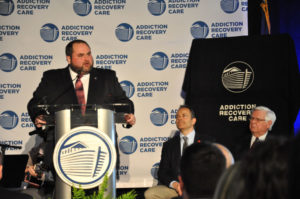SOMERSET – Success in taking clients from addiction to meaningful employment has garnered Addiction Recovery Care (ARC) national recognition.
Due to the success of its flagship vocational training program – the Peer Support Specialist Academy – ARC has been selected as one of the first organizations in the country to participate in the Building Evidence on Employment Strategies for Low-Income Families (BEES) project.
“That the U.S. Department of Health and Human Services selected ARC to participate in this study is truly an honor, and it demonstrates what is possible when the best practices of treatment are coupled with job training that leads to a meaningful economic opportunity,” said Tim Robinson, Chief Executive Officer and owner of ARC.
In addition, Robinson recognized four organizations with Peer Support Specialist Academy Partners Awards for their contributions to the program’s success: Operation UNITE, Shaping Our Appalachian Region (SOAR), Eastern Kentucky Concentrated Employment Program (EKCEP), and Sullivan University.
Kentucky Governor Matt Bevin and Fifth District U.S. Congressman Harold “Hal” Rogers were among those showering praise upon the network of treatment centers during a ceremony Saturday, March 23, at the Lake Hills Oasis facility in Somerset.
Partnerships have proven to be effective in helping bridge the gap between those who often feel like they are on a hopeless journey and recovery, Rogers said.
“No single organization can beat this working alone,” he said, drawing a correlation to the holistic approach used by Operation UNITE that has become a national model in addressing the opioid epidemic.
 Robinson credited funding from UNITE’s Treatment Voucher program – which provides funding for three months of residential long-term treatment – with making it possible for ARC to offer addiction recovery services to the citizens of Eastern Kentucky.
Robinson credited funding from UNITE’s Treatment Voucher program – which provides funding for three months of residential long-term treatment – with making it possible for ARC to offer addiction recovery services to the citizens of Eastern Kentucky.
“We have a responsibility to help others – simple as that,” said Hale. “That’s the purpose of a voucher, of treatment. But it goes much further than just helping someone move into treatment. Life continues after one leaves that treatment facility.”
“We have a responsibility to help those suffering from a substance use disorder to learn to live in recovery, to regain their dignity as a person created in God’s image – and, one way they do that is through employment,” Hale continued. “Tim recognized that, and instead of just talking about the need, stepped up and sought ways to provide jobs and employment opportunities.”
Bevin likened the network of partners to that of a tapestry. When viewed from the back, it is rough, ugly, comprised of many different types of thread. But, when viewed from the front, it is something amazingly beautiful and extraordinary.
“Each of us has a specific purpose,” Bevin said. “We have a responsibility to engage in full in the recovery process. Programs like Addiction Recovery Care are making dreams a reality.”
Van Ingram, Executive Director of the Kentucky Office of Drug Control Policy, also lauded the vocational program and need for businesses to step up and be part of the solution.
“People in recovery can be the best employees you have,” Ingram said.
ARC operates a network of 30 addiction treatment centers in Eastern and Central Kentucky. The organization, headquartered in Louisa, offers a full continuum of care, including detox, residential, transitional, intensive outpatient, outpatient, medication-assisted treatment (MAT), vocational rehabilitation, and job training.
The treatment centers are holistic with CARF-accredited clinical programs, medical services directed by an addictionologist, a spirituality emphasis that includes the 12 steps and pastoral care, and a broadening scope of vocational training opportunities for clients.
These vocational training programs have led to ARC becoming a national leader in taking clients from addiction to meaningful employment.
The Peer Support Specialist Academy is a six- to nine-month, college equivalent training program designed to teach ARC clients how to help others to recover from a substance use disorder. To date, the Academy has seen success rates of 80 percent, with success being defined as living in recovery and being employed, Robinson said.
